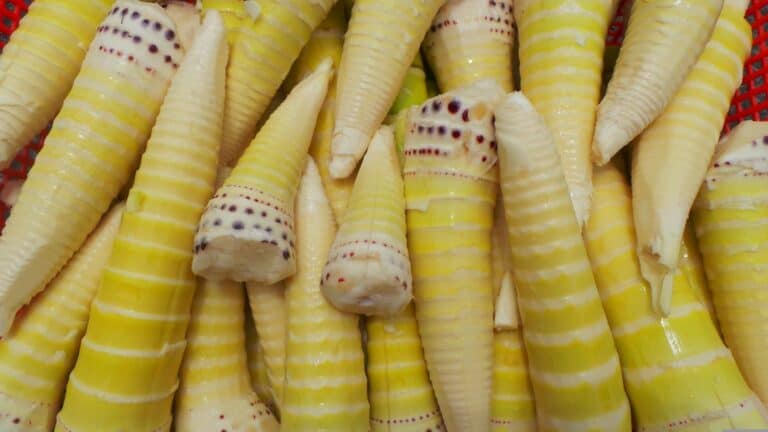
In any kind of survival situation, be it a long-term one after a society toppling event or a relatively short-term one where you are stranded and lost out in the wilderness, knowing what you can and can eat in an emergency can make all the difference in your chances.
Nature can provide us with all sorts of foods that are good and nutritious to eat, but there are just as many that can make us sick or even kill us. It’s best to know which is which before you find yourself in that situation!
How about something like bamboo shoots? Can you eat bamboo shoots to survive?
Yes, you can eat bamboo shoots as food so long as they are cooked to neutralize toxins that are present. Bamboo shoots are highly nutritious, containing an excellent assortment of vitamins and minerals.
Bamboo shoots are not just a do-or-die type of food for desperate survivors: they are eaten all around the world but predominantly in Asia as an integral part of various cuisines, and are prepared and all kinds of ways.
This is one survival food that might save the day, and you might wind up liking it so much after you tried that you incorporated into your everyday diet.
Keep reading and we will tell you everything you need to know.
Where Can Bamboo Shoots Be Found?
Bamboo shoots can be found anywhere in the world where bamboo is growing, and bamboo most typically though not always grows in warm tropical areas with high soil moisture and humidity.
Most bamboo species, of which there are many, grow in monsoonal climates, and can be found in parts of Africa, Asia, Australia, South America, Caribbean islands, and certain areas of the United States.
Bamboo shoots are simply the edible sprouts that grow from the underground roots (actually rhizomes) of bamboo plants and look like cylindrical, almost woven stalks with a pointed tip on one end.
They are usually white or green in color, and can be anywhere from one to ten inches long. Highly distinctive, they are easy to spot anywhere bamboo is growing.
Caution: Raw Bamboo Shoots Contain Toxins
Before we go any further, you should know that bamboo shoots (specifically the immature plant) contain toxins known to cause allergic reactions, and some can cause serious cyanide poisoning if consumed.
Some, though not all, people report reactions ranging from mild itching and redness to serious swelling and difficulty breathing as a direct consequence of handling!
These complications generally present in pretty short order after contact, and are worse in case of contact with broken skin.
But the major concern for our purposes is its toxicity when eaten. Bamboo shoots contain toxic compounds called cyanogenic glycosides, and a clue to their inherent danger is in the name: when eaten, they turn into cyanide in the gut!
Cyanide poisoning is potentially fatal, and will cause shortness of breath, weak and slow pulse, dizziness, nausea and vomiting, convulsions and eventually coma followed by death. Survivors often have severe neurological issues.
Scary stuff to be sure, but you don’t need to worry too much since these toxins can be neutralized by cooking.
Simply boiling or steaming the shoots for several minutes until tender will destroy the toxins, making them safe to eat.
Don’t eat raw shoots and you will be fine.
Nutritional Facts about Bamboo Shoots
Bamboo shoots are a great source of nutrition whether you are in a survival situation or not, providing an excellent selection of vitamins, minerals, fiber, and other essential nutrients.
They are somewhat low in calories but high in protein by weight and also have some carbohydrates for quick energy, making them a great choice for easy to find and prepare food in the wild.
Bamboo shoots are rich in B vitamins such as B1, B2, and B6 and also contain lesser amounts of B3, folate, Vitamin C and Vitamin E. This combination makes it an ideal source for aiding energy production and metabolism within the body.
It is also high in manganese, zinc, and potassium which are further important for proper metabolic function and overall health.
Finally, they are a great source of dietary fiber, aiding digestion and promoting regularity. In short, bamboo shoots are an excellent source of nutrition during any survival situation and should be strongly considered when planning your food stockpile.
What Do Bamboo Shoots Taste Like?
Bamboo shoots are commonly said to taste very much like water chestnuts, if you have ever had those.
The flavor is most commonly described as bright, woody, earthy and usually sweetly nut-like if fresh and prepared properly. Even though bamboo is a type of grass they really don’t have that sort of green, vegetal taste you’d expect.
Many people like them as a component of various dishes, and even prepared by themselves with a bit of oil and seasoning.
Remember that any nasty or bitter taste may indicate the presence of toxins, so make sure you cook the shoots longer if present before eating, and discard any that you think are questionable.
Overall, bamboo shoots are a great wild food that can provide much needed nutrition in any survival situation.
The toxins present in raw bamboo must be cooked to neutralize them in order to be safe for consumption, but they offer great flavor and lots of essential nutrients once prepared correctly.
Don’t forget to add them to your next grocery shopping list and you can give them a try for yourself.
Can You Eat the Bark of Bamboo Shoots?
Bamboo does not really have bark in the strictest botanical sense, and instead has what is known as culm. It should be cut away or peeled and discarded.
It is highly fibrous, tough, and difficult to chew. You are better off getting at the tender heart inside.
Can You Eat Bamboo Shoot Buds?
Yes. The “bud” is the shoot itself, or an offshoot of the shoot, in some species. Peel and trash the tough outer culm and you can eat what remains after it is cooked.
Can You Eat Bamboo Shoot Leaves?
Yes. The leaves of mature bamboo plants are also edible, and highly nutritious in their own right. They can be cooked as greens or added raw to salads for a crunchy, nutty flavor.
Can You Eat Bamboo Shoot Roots?
Usually no. Bamboo root systems are very shallow and consist of rhizomes that spread out from the main plant. The entire root system is woody and fibrous, so it is not usually sought for eating.
Of all the many bamboo species in the world, only a few have rhizomes that are regularly cultivated or collected for eating.
Compare this to the shoots themselves, which are much more widely eaten and in many, many different ways.
Are There Risks Associated with Eating Bamboo Shoots?
The only real risk from eating bamboo shoots in the short term comes from the presence of the cyanide precursor toxins we discussed earlier.
So long as you take care to thoroughly cook the shoots and discard any with unpleasant smells or tastes, then there shouldn’t be any immediate health issues from eating them.
In the long term, the major risk is that bamboo shoots are not nutritionally complete, and you shouldn’t be eating them alone if you have any choice.
It is important to get a variety of foods in order to ensure that you are getting all the essential nutrients your body needs for optimal health, even in the dire situation of a survival scenario.
Malnutrition is a slow but certain and insidious killer, so always be sure to supplement your diet with a variety of other wild-sourced foods if at all possible.
Tom Marlowe practically grew up with a gun in his hand, and has held all kinds of jobs in the gun industry: range safety, sales, instruction and consulting, Tom has the experience to help civilian shooters figure out what will work best for them.

